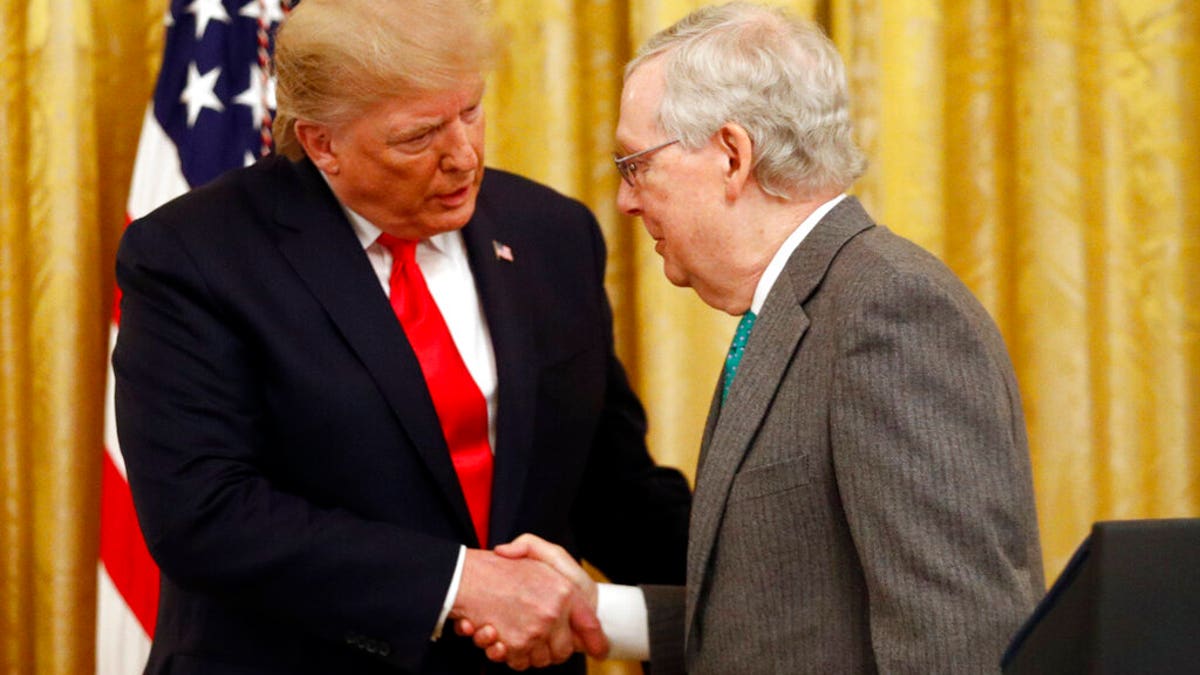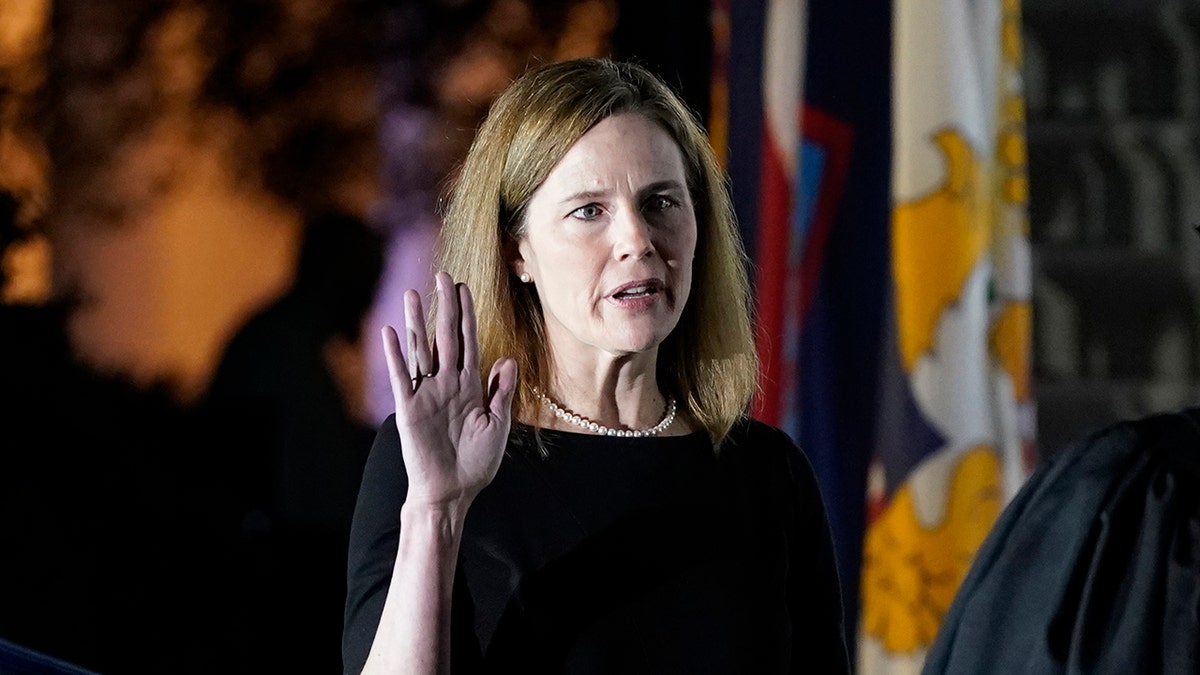McConnell reacts to Amy Coney Barrett's Supreme Court confirmation
Senate Majority Leader joins Shannon Bream for a 'Fox News @ Night' exclusive interview
With Justice Amy Coney Barrett now on the Supreme Court, a new vacancy has opened on the 7th U.S. Circuit Court of Appeals where she previously sat, and President Trump has already named the person he plans to have replace her on that bench.
Add to that the death of 1st U.S. Circuit Court of Appeals Judge Juan Torruella, reported Monday by Reuters, and Trump and Senate Majority Leader Mitch McConnell, R-Ky., could confirm another two lifetime-appointed judges just one level below the Supreme Court even if both Senate Republicans and the president lose in the Nov. 3 election.
For Barrett's old seat, Trump announced last Wednesday he plans to nominate Thomas L. Kirsch II, who is currently the U.S. Attorney for the Northern District of Indiana. Kirsch is a former clerk for Judge John Daniel Tinder in the Southern District of Indiana, was previously a partner at a private law firm and held other positions with the Department of Justice (DOJ). Kirsch is a graduate of Indiana University and Harvard Law School.
It's unclear who Trump might nominate to succeed Torruella.

President Trump shakes hands with Senate Majority Leader Mitch McConnell of Ky., in the East Room of the White House during an event about Trump's judicial appointments, on Nov. 6, 2019, in Washington. (AP Photo/Patrick Semansky)
After the Senate confirmed Judge Cory Wison to the 5th Circuit earlier this year, McConnell took pride in the fact that there were officially zero vacant circuit judgeships.
"When we depart this chamber today, there will not be a single circuit court vacancy anywhere in the nation for the first time in at least 40 years," McConnell said at the time.
"The single most consequential thing we can do is these lifetime appointments of men and women to the court who believe that the job of a judge is to follow the law," he told the annual Values Voter conference in 2018.
The majority leader has operated under the mantra of "no vacancy left behind," and it is possible he won't be forced to leave these newly-minted circuit vacancies behind either. Trump announced his intention to nominate Kirsch on Oct. 21, leaving open a reasonable timeline for him to be confirmed by a Republican Senate even if the GOP loses its majority.
Under the tradition for circuit court nominees, senators are given four weeks of notice after a nominee is announced before a Judiciary Committee hearing, then four weeks after the hearing before the nominee is voted on.

U.S. Attorney Thomas Kirsch is President Trump's pick to replace Justice Amy Coney Barrett on the 7th Circuit Court of Appeals. (Official)
SENATE CONFIRMS AMY CONEY BARRETT TO SUPREME COURT, CEMENTS 6-3 CONSERVATIVE MAJORITY
D.C. Circuit Judge Justin Walker, who was fiercely opposed by Democrats earlier this year, for example, was nominated on April 3. The Judiciary Committee then had a hearing on him on May 6 and voted him out of committee on June 4. He was confirmed on June 18.
If a similar timeline is followed from when Trump announced his intention to nominate Kirsch -- Krisch has not been formally nominated yet as Barrett was not yet seated on the Supreme Court -- there could be a Judiciary Committee vote on Kirsch before Christmas.
The new Congress will convene on Jan 3, 2021, meaning that if Republicans lose the Senate majority they would need to confirm him before that time. But if they maintain the Senate majority and Biden wins the presidency, they would be able to confirm him in early-to-mid January before Biden assumes office on Jan. 20.
If Republicans maintain the Senate and White House, of course, the time pressure on the nomination goes away.

Amy Coney Barrett is sworn in on the South Lawn of the White House in Washington, Monday, Oct. 26, 2020. Barrett took her judicial oath Tuesday morning and officially became a Supreme Court justice. (AP Photo/Patrick Semansky)
A confirmation effort for a successor to Torruella will be more pressed for time because news broke of his death Monday. Republicans would likely need to accelerate the successor's confirmation process faster than the traditional time for circuit nominees in order to ensure that person is confirmed before Jan. 3 if Republicans lose both the presidency and White House.
But that tradition is just that -- a tradition, and not a rule.
And there is modern precedent for a circuit judge's confirmation process happening during the lame-duck months of a first-term president. Former President Jimmy Carter nominated Stephen Breyer, who is currently a Supreme Court justice, to the 1st Circuit after he lost the 1980 presidential election. He was confirmed shortly thereafter on Dec. 9.
This, of course, happened before the modern acrimony around judicial appointments that many trace back to Democrats blocking Reagan nominee Robert Bork. Stuart E. Eizenstat, a former Carter adviser wrote in the Washington Post in 2016 that late Sen. Strom Thurmond, R-S.C., even whipped Republican support for Breyer at the request of late Sen. Edward Kennedy, D-Mass.
Democrats have decried Republicans' efforts not just to fill three Supreme Court seats during Trump's tenure thus far, but also their dogged dedication to filling vacancies in circuit and district courts as well.
CLICK HERE TO GET THE FOX NEWS APP
Sen. Chris Coons, D-Del., on Monday night told MSNBC host Rachel Maddow that he wants to have a "wide open conversation about how do we rebalance our courts," in light of McConnell's and Trump's four-year-long focus on filling judicial vacancies.
"Yes, the two Supreme Court cases that have been stolen, where these processes that are just wildly hypocritical have been used to jam through partisan nominees. But we've got to look at our federal courts as a whole," Coons said.
He added: "Because they've seen hundreds of conservative judges put on circuit courts and district courts all over the country over the last four years. In many cases, too young, too unqualified and too far right to be allowed to sit peaceably without our reexamining the process, the results and the consequences."
But Mike Davis, the founder of the Article III Project, a group that backs Trump judicial nominees, said Tuesday he thinks the Senate has "plenty of time and precedent to fill both seats this year."
"The American people hired this President and Republican Senate until at least January, the Senate is still on the American payroll, filling judicial vacancies is their most important constitutional duty, so they should continue to do the job that we hired them to do," Davis said. "A3P agrees with Senate Majority Leader Mitch McConnell: Leave no vacancy behind."






